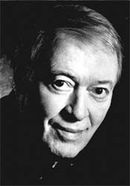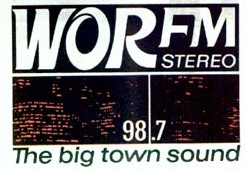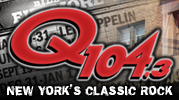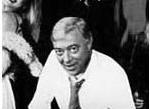Scott Muni
JR Hafer
I'm fortunate. I have first-hand memories of radio personalities, such as Scott Muni. He was the "professor," of rock and roll. I never met Muni, but I count him among my friends. For me, as many others, his voice transcended all boundaries when he allowed me into his world.






Muni was a jock, a dj, an announcer, at WNEW-FM, in New York City. At 565 5th Avenue, to be specific. He talked, easily, from Manhattan, commotion central. You'd think he was, in your home, having coffee.
Scott Muni programmed WNEW-FM. He devised an urbane, winning radio format. He is thus legend.
I shared many hours with "Scottso," as fans warmly called him. His show on WNEW-FM was a staple, a constant, in of my otherwise chaotic day. Scott Muni brought focus, to my hectic life, through music and wit.
When the Scott Muni theme started, I learned over, as did a million others, to pump-up the radio volume. The Muni theme was a carry-over from old Big Band days. An orchestral arrangement, his theme deviated from the progressive-rock format. It worked for Muni, and me.
Muni knew everything there was to know about rock and roll. He knew radio, too; what worked and what didn't work. That's why we called him the "professor."
In his gravelly voice, backed with encyclopaedic knowledge, there was a sense of authority and friendliness. This was most obvious in the interviews he conducted. He stooged for Robin Williams, a few times. He nursed Jimmy Page, of Led Zeppelin. On 22 august 1972, Muni was an on-air crisis negotiator, for a hostage-taking bank robber.
The robber called Muni for solace, I guess. There were 250 New York City police officers outside, the FBI, every media outlet in the city and 2000 or more onlookers. Inside the bank were robber, Sonny Wortzik; his lover, Sal and eight hostages. Sonny needed money to pay for surgery Sal needed. A ten-minute job turned into a four-hour circus. That Sonny sought solace surprised some, maybe. Scott Muni was glad to help. For those who listened to him regularly, they knew such kindness was Muni being Muni.
Scott and Sonny had a long talk, on the air. They talked the music of Bob Dylan. Sonny asked Muni to play a Grateful Dead song. He did. Sonny found it soothing.
In an atypical movement of savvy, WNEW-FM management didn't pull the plug. It let the call take its course. That bizarre incident inspired the 1975 movie, "Dog Day Afternoon," starring Al Pacino and John Cazale. Direct Sydney Lumet cut Muni from the movie. Television got the play.
Scottso was there for a listener. Television was there for ratings. Who would you call for solace?
Born 10 May 1930, in Wichita, Kansas, Donald Allen Munoz grew up in New Orleans. In 1950, when he was in the US Marine Corps, he got a job, on Radio Guam, reading "Dear John" letters, to his comrades, in uniform. What an introduction to radio.
Munoz flirted with acting, when he returned to civilian life, but fell for the allure of local radio. By the early 1950s, network radio was almost gone, displaced by television. Now, local stations filled the air time between commercials, not the networks. The filler had to be cheap.
Recorded music, hosted by disc jockies (djs), was the lowest cost solution. Local music stores traded records for radio spots or offhand mentions. "Here's a brand new record, by a swinging group, 'Billy Haley and the Comments,' we picked it up at the Music Shoppe, on Yonge Street, today." Djs worked for minimum wage or less. By 1955, djs were jockeying the discs on most stations across North America.
Djs quickly gained local fame. Listeners saw djs as friends. Loyal friend, the djs visited each day, at the same time and entertained. The allure of local radio, for young men, mostly, but some women, too, is easy to understand.
Some djs learned to make money, off their radio fame, that is, outside the station. These djs found fortune and fame, in local radio. Dick Clark learned how to make money from his radio job.
As Munoz had on-air experience, his first dj job came easy. He replaced, James Albert "Alan" Freed, at WAKR-AM, in Akron, Ohio. Freed renamed rhythm and blues music, "Rock and Roll," when he worked WJW, in Cleveland. On air checks, from WJW, Freed describes rhythm and blues as rocking and rolling. Freed admits, "Outrageous for the time, that he's "rocking and rolling, with the music."
That was late 1951. By spring 1952, Freed refers to all the music he plays as rock and roll and promotes the first rock show, at the Cleveland Arena. New York called. Freed was off. The Big Apple called. There he knew he'd find fame and fortune, but didn't see the fall coming.
Munoz wanted to simplify his name. Don Munoz was a bit clumsy, for radio. He needed a more generic sounding name. One Saturday, Don Munoz signed off his shift, saying, "I'll see you Monday." On Monday, Scott Muni was doing the Munoz shift.
Scott Muni moved to New York City, in 1958. His first station, in New York City, was WMCA-AM, before its "Good Guys" era. He moved to WABC-AM, in 1960, and to WOR-FM, in 1966, where the free-form progressive format was taking hold.
From 1967 to 1998, he worked WNEW-FM, as dj and programme director. The free-form progressive format jelled at WNEW-FM, with the leadership of Muni. Dennis Elsas, a WNEW-FM dj, said Muni was "the heart and soul of the place." Management liked the profits.



Scott Muni with Ringo Starr, Bo Diddley and George Harrison
The progressive format, developed by Muni, was a child of the baby boomer idealism, of the 1960s. The format expanded both the music and talk repertoire. Unlike the Drake format, which demanded a short play list, little talk and tight production, progressive radio used an almost unlimited play list, much talk and loose production.
As with most good radio or television, law is the key. In 1965, the Federal Communications Commission (FCC), which regulates radio, imposed a non-duplication rule for FM. FM could no longer simply simulcast a co-owned AM station.
For a generation or more, FM radio had to air alternative content, from a co-owned AM station. The FCC ushered in an era of unbridled creative opportunity. Few had what it took to seize the opportunity, but Scott Muni did.
The all-women WNEW-FM on air line up, in 1966, was a weak gimmick, intended to meet the FCC rule. Cost was a major hurdle for many FM stations. As Alison Steele, noted, WNEW-AM was paying its on air staff $250,000 a year and the ratings support the salaries. WNEW-FM could barely make scale, of $125 a week, with no ratings. Gimmicks were all management thought it had.
Under Muni, the progressive format was inexpensive, with high ratings. The djs, the on-air staff, could play whatever music he or she wanted; the music policy was mostly up the djs. The djs could talk, on point, all they wanted, take calls from listeners or roll the music. The freedom attracted top talent, who worked for less than they ask at a typical station.
As more FM went to air, the stakes increased. Advertising revenue streamed to progressive formats, where the under 24 year old listeners were readily available, for a song. Management recognized the potential, which meant standardizing the product. A standardized FM format was predictable and safe. An antiwar, pro social responsibility dj, such as Rosko, might offend a free-spending advertiser.
By 1970, management demanded clocks or schedules, for FM formats, and a pre-set rotation of records. Djs now influenced, not picked, the music they played. Their freedom to talk evaporated. Commercials disrupted the flow and hogged the time.
Muni, somehow, was able to work around, over or through the increasing controls. Millions of New Yorkers listened to WNEW-FM, day and night. They wanted to hear the music and the talk. Management doesn't like to fool with a winning format. Muni had much room to work and play.
By the middle 1970s, AOR had changed. Originally, progressive album oriented rock, the format morphed into album oriented radio. Clocks and play lists were tightening. Advertising clutter increased. "Focus tracks," those programmers thought interested listeners most, received more attention. A slick, distant style crept into the production. Bureaucratic programmers found success.
When Disco took over, in the late 1970s, it dealt a final blow to all but the most entrenched progressive forms of radio, most of it on college stations. Album oriented radio hung on a bit longer. The writing was on the wall: a new form of superficial, pleasure-seeking pop music was here to stay.
Alison Steele read the signs, correctly, and left WNEW-FM, in 1979. A pay issue, the station wanted to reduce her salary, also played a part. It was the final shot in the murder of the creative, imaginative and successful format Muni developed.
New York City is the hub of entertainment. Celebrities visited WNEW-FM, to talk with their friend "Scottso," during his show. Jimmy Page, of Led Zeppelin, passed out on the studio floor, a result of heavy partying the night before. Unyielding, Muni revived Page, continuing the interview, sitting on the floor next to his prone guest. Muni spent fifty years developing friendships, with John Lennon, Paul McCartney, Springsteen and Robin Williams, among many others. Everybody knew "Scottso." The older generation had William B. Williams, on WNEW-AM. It was the WNEW way.
The WNEW parent company went through several ownership changes. By 1998, the AM side was sold off and the FM side lost direction, floundered and, says a wag, "almost went Spanish." Too much for Muni, he moved to WAXQ-FM, where he hosted a noon hour "Classic Rock" show.
Muni voiced many radio commercials. Rolaids was perhaps his most memorable voice work: "How do you spell relief?" He was also the voice of promotional messages for "Monday Night Football," on ABC television.
Donald Munoz was most proud of being a member of the United States Marine Corps and Scott Muni, rock and roll host, a legend, in fact. He had his priorities right. Early in 2004, Muni had a stroke, passing away 28 September 2004.
At WNEW-FM, Muni interviewed John Lennon, several times. He and Lennon became good friends. After the Lennon assassination, in 1980, Muni promised to open every show, with a Lennon or "Beatles" record.
He kept his promise. At WAXQ-FM, four "Beatles" records started each of his shows. After his death, WAXQ-FM continued the Muni tradition, with a "12 o'clock Beatles Block," 12:00 pm to 12:20 pm, Monday to Friday.



Scott Muni, sane, sensible and successful, has escaped inducted in the Rock and Roll Hall of Fame or the Radio Hall of Fame. Mel Karmazin is in the Radio Hall of Fame. So, too, is Dick Purtan. It's time for the minds to reconsider Scott Muni. His star shines as brightly ad Bob Steele, Eddie Cantor, Wolfman Jack, Les Tremayne, Stan Freeberg and Gerry Williams. Wait, circumstances are not a dire as first thought. Jack Benny isn't in the Radio Hall of Fame, either.
Nor is Larry Glick, Carl de Suze, Norm Nathan, Donnie Berns, Don Barrett, Allison Steele or Dick Summer, in the Hall. Maybe the company outside the Hall is better than inside. Politics aside, thanks for the memories, "Scottso."
Note: Scott Muni is a member of the Rock and Roll Hall of Fame. Djs are selected, for membership, by the staff of the Hall. Muni was selected for his work at WOR-FM and WNEW-FM as well as contributions to radio in the 1970s.
JR Hafer writes from his home in central Florida.
- Alison Steele
- Aging as a State of Mind
- Why and Wherefore
- The Kingston Trio
- Popcorn Sutton
- WNEW Radio
- Life as a Classroom
Click above to tell a friend about this article.
Recommended
- David Simmonds
- Advice for Gordon Sondland
- All the Rage
- Name that Dump

- Sjef Frenken
- Of Exes and Owes
- Je Regrette
- The Mystery of it All

- Jennifer Flaten
- Watching Time
- Candy, Candy, Candy
- School's Out

- M Alan Roberts
- Lessons of the Bucket
- Please Shut Up
- Checkmate

Recommended
- Matt Seinberg
- Feeding the Gadgets
- Boardwalk Empire Ends
- Walking

- Streeter Click
- Remembering the Pioneers
- Satirizing Richard Nixon
- What is Journalism

- JR Hafer
- The Kingston Trio
- WNEW Radio
- Habit-forming

Recommended
- AJ Robinson
- Memories of
- Making Candels
- Ron Death-Santis

- Jane Doe
- Ted 2
- US Election 2016
- The Jazz Age

- M Adam Roberts
- Day of the Dolphines
- Can You Hear Me Now
- No Quitter

- Ricardo Teixeira
- The Unicorn
- Harmony
- There is a Light



